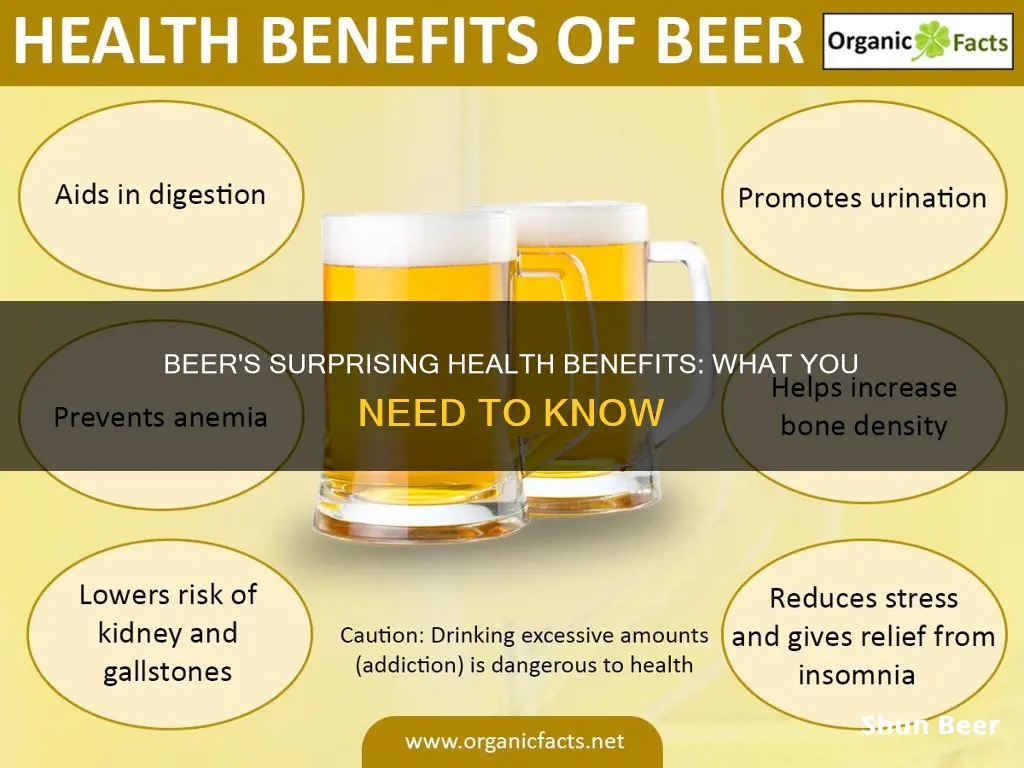
Beer is one of the most popular alcoholic beverages worldwide, but is it good for your health? When consumed in moderation, beer may offer several health benefits. These include a reduced risk of heart disease, improved blood sugar control, stronger bones, and a lower risk of dementia. Beer is also an excellent source of vitamins and minerals, including B vitamins, phosphorus, folate, and niacin. In addition, the antioxidants in beer can help fight free radicals and certain forms of cancer. However, excessive beer consumption can lead to negative health consequences such as weight gain, liver disease, and cardiovascular disease. Therefore, it is important to drink beer in moderation and not use it as a substitute for a nutritious, balanced diet.
What You'll Learn

Beer may reduce the risk of heart disease
HDL Cholesterol
Beer contains antioxidants, which can help to prevent heart disease. A 2016 study found that moderate beer consumption (one drink per day for women and up to two drinks per day for men) was associated with higher levels of high-density lipoprotein (HDL) cholesterol, or "good" cholesterol. HDL cholesterol helps to remove excess cholesterol from the body, preventing it from building up in the arteries and reducing the risk of heart disease.
Cardiovascular Disease
A 2016 review article concluded that low to moderate beer consumption (up to one drink per day for women and up to two drinks per day for men) was associated with a decreased risk of cardiovascular disease. This may be due to the antioxidants found in beer, which can help to protect the heart.
Heart Attack
A study presented at the American Heart Association Scientific Sessions in 2016 followed 80,000 participants for six years and found that moderate drinkers had slower declines in HDL cholesterol levels and a lower risk of cardiovascular disease. Additionally, among men who had already suffered a heart attack, those who drank beer moderately were 42% less likely to die of heart disease.
Silicon
Beer contains silicon, an essential mineral for bone formation. A review published in the International Journal of Endocrinology found that moderate beer consumption increased bone density in men. Silicon may also help to protect the brain from compounds that are thought to cause cognitive diseases.
Alzheimer's and Dementia
A study by researchers at Loyola University in Chicago found that moderate beer drinkers were 23% less likely to develop Alzheimer's and dementia than those who didn't drink beer. This may be due to the silicon content in beer, as well as the fact that beer raises HDL cholesterol, which improves blood flow to the brain.
Beer and Medication: Safe Mix or Health Risk?
You may want to see also

Beer may lower the risk of diabetes
Beer can also interfere with the liver's ability to regulate blood sugar. Alcohol can cause blood glucose levels to rise or fall, depending on how much a person drinks. If an individual is on insulin or other anti-hyperglycemic medications, drinking alcohol can lead to dangerously low blood sugar for up to 24 hours after drinking. Therefore, it is important to drink in moderation and not on an empty stomach.
Additionally, beer contains antioxidants that can help prevent cell damage. According to the American Heart Association, red wine contains antioxidants that help prevent cell damage by counteracting free radicals. However, it is important to note that this presumed benefit is just a theory and more research is needed to establish a definitive link.
While beer may have potential health benefits, excessive consumption can lead to negative health consequences. Heavy drinking can increase the risk of weight gain, liver disease, cardiovascular disease, and other health issues. Therefore, it is important to drink in moderation and prioritize a healthy lifestyle that includes regular exercise and a balanced diet.
Beer and Chemo: What's Safe to Drink?
You may want to see also

Beer may improve bone density
Preliminary research by Charlie Bamforth, a professor of brewing sciences at the University of California, Davis, suggests that beer may contain prebiotics that feed the good bacteria in our gut. Beer is also a good source of vitamin B12 and folic acid, which help treat anemia caused by deficiency. Folic acid also aids in growth, brain power, and memory.
It is important to note that excessive beer consumption can lead to adverse health consequences, including an increased risk of cardiovascular disease, neuropsychiatric diseases, and cancer. Therefore, it is recommended to consume beer in moderation to achieve any potential health benefits.
Beer and Bulking: What's the Verdict?
You may want to see also

Beer may reduce the risk of dementia
According to a study of nearly 4 million South Koreans, drinking one or two standard beers per day may reduce the risk of dementia by 17% to 21%. However, consuming more than two drinks a day increases this risk. The study also found that reducing heavy drinking to moderate levels lowered the risk of dementia.
Beer contains nutrients such as silicon, which may play a role in preventing brain disorders. Additionally, hops, a bittering agent in beer, has anti-inflammatory properties and may suppress neuroinflammation.
It is important to note that the relationship between alcohol and health is complex, and drinking alcohol is not recommended as a way to reduce the risk of dementia. Other factors such as diet, exercise, and genetic factors also play a role in brain health.
Did Cheers' Norm Drink Real Beer?
You may want to see also

Beer may prevent cancer
According to the National Institute on Alcohol Abuse and Alcoholism, a standard alcoholic drink in the United States contains 14 grams of pure alcohol. This amount of alcohol is typically found in 12 fluid ounces of beer. The federal government's Dietary Guidelines for Americans, 2020-2025, recommend that individuals who drink alcohol do so in moderation by limiting consumption to two drinks or less per day for men and one drink or less per day for women.
Excessive alcohol consumption, including beer, is associated with an increased risk of developing certain types of cancer. Moderate to heavy drinking is linked to higher risks of head and neck cancers, including oral cavity, pharynx (throat), and larynx (voice box) cancers. The risks are even higher among those who consume large amounts of alcohol and also use tobacco.
Esophageal cancer, specifically esophageal squamous cell carcinoma, is also associated with alcohol consumption at any level, with risks increasing from light to heavy drinking. Liver cancer risks are approximately doubled with heavy alcohol consumption.
Breast cancer risk is also elevated with increasing alcohol intake. Light drinkers have a slightly increased risk, while moderate and heavy drinkers face a more substantial increase in risk.
Additionally, moderate to heavy alcohol consumption is associated with a higher risk of colorectal cancers. While the evidence for an association with other types of cancer is inconsistent or lacking, recent studies suggest that alcohol consumption is linked to increased risks of melanoma, prostate cancer, and pancreatic cancer.
While some studies suggest that light to moderate beer consumption may have health benefits, such as improved heart health and reduced risk of diabetes and osteoporosis, it is important to weigh these potential benefits against the elevated risk of developing cancer and other serious health conditions associated with alcohol consumption.
Beer and Prediabetes: What's the Verdict?
You may want to see also
Frequently asked questions
Drinking beer in moderation may have some health benefits, including:
- Lower risk of heart disease
- Improved blood sugar levels
- Increased bone strength
- Reduced risk of dementia
- Improved cholesterol levels
Excessive consumption of beer can lead to various health issues. It is recommended to drink in moderation, which is defined as one drink per day for women and up to two drinks per day for men.
Beer contains various nutrients, including B vitamins, phosphorus, folate, niacin, protein, fiber, and silicon.







